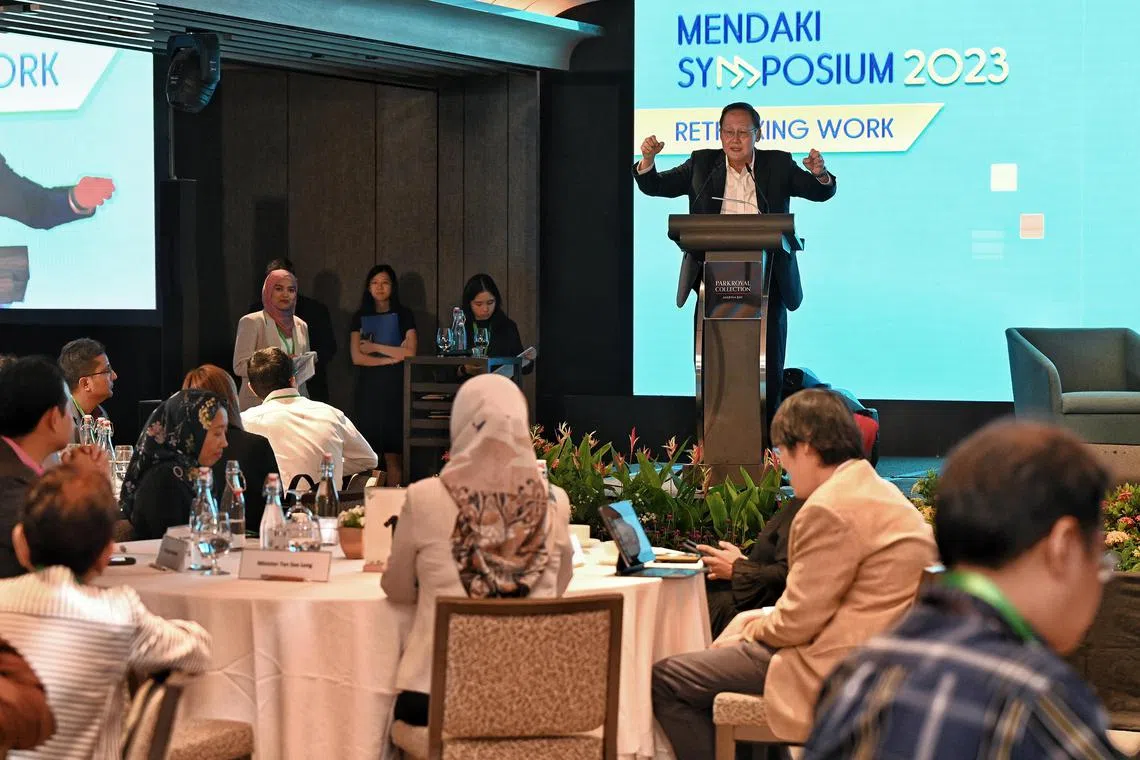75% of working Malay-Muslims keen on reskilling and upgrading: Mendaki study
Sign up now: Get ST's newsletters delivered to your inbox

Manpower Minister Tan See Leng said in a speech at the symposium that its focus on employment and lifelong learning is relevant to everyone in Singapore.
PHOTO: BERITA HARIAN
Follow topic:
SINGAPORE - A new study on employment and employability within the Malay-Muslim community has found that those who reported household incomes higher than the national median Malay income were more likely to be interested in learning new skills.
Those in the workforce or providing financial support to their families were also more likely to display such attitudes.
The study said those who found their jobs through referrals or those who were self-employed were more likely to display a lukewarm attitude towards learning.
Over 1,000 Malay-Muslim respondents, whether employed or jobless at the time, were polled over six months from October 2021 to February 2022 for the study. It is the first of its kind by Yayasan Mendaki.
The study aimed to uncover the factors that influence career decisions made by Malay-Muslims of working age and their attitudes towards lifelong learning. It also looked at whether life stages played a part in decisions such as enrolling for upskilling courses and related challenges faced by the respondents.
The findings were released on Thursday at a symposium organised by Mendaki.
Mr Zaqy Mohamad, Senior Minister of State for Manpower and the deputy chairman of Yayasan Mendaki, said insights from the study will also allow the Government to better look at the areas in which further intervention might be needed.
Speaking to the media about the findings on the sidelines of the symposium, he said: “Among the working population, 75 per cent of them are keen to continue looking at reskilling and upgrading, and that is a good sign showing that government policies are working, and they are getting the message of the importance of reskilling and upgrading.
“Overall, attitudes are positive, generally there is a willingness to upgrade skills, but I think there is some work that needs to be done to facilitate (this).”
The symposium, which had the theme of “Rethinking Work”, was held at ParkRoyal Collection Marina Bay and attended by about 300 people such as policymakers, community partners and researchers.
The Mendaki survey also revealed concerns the community faced in entering the workforce. These were predominantly to do with caretaking responsibilities, as well as temporary illnesses or injuries.
It found that some challenges individuals faced in entering or re-entering the workforce included the lack of work-life balance, the need to acquire new skills and a fear of uncertainty.
Looking at attitudes towards lifelong learning, the study showed more than 75 per cent of those polled were interested in acquiring more hard skills such as in computer and management, and more than 80 per cent in learning soft skills such as communication.
These were among the most popular areas of interest for the community, according to the study.
Mr Zaqy said there had been concerns in the past about upskilling and upgrading not being “high on the agenda” for members of the Malay-Muslim community.
“My sense is that there is a movement forward... I think the message is coming through, the question is how we overcome some of the practical challenges,” he said.
Manpower Minister Tan See Leng said in a speech at the symposium that its focus on employment and lifelong learning is relevant not just to the Malay-Muslim community but to everyone in Singapore. “In the vast overwhelming majority of our lives and our careers, it is very unlikely that you will end up just holding one job. And because of that, we constantly need to pick up new skills to stay relevant, particularly in the face of all these transformations and disruptions, so that we can continue to move up the career ladder and improve our career prospects,” he said.
Amid the significant headwinds the economy is facing this year, the Government is committed to supporting Singaporeans’ aspirations, from supporting fresh graduates through the transition from school to the workplace, to empowering mid-career workers to be employable and relevant, Dr Tan added.
“The Government will continue to invest in Singaporeans to ensure that you have the skill sets and capabilities to succeed throughout your working lives,” he said.
“For those who have unfortunately – because of curveballs or perhaps bad luck – lost their jobs, we understand, and we empathise with your anxieties and frustrations. We want to help you bounce back and emerge stronger than before.”
He also highlighted how Mendaki has been working with NTUC’s Employability and Employment Institute (e2i), NTUC LearningHub, Workforce Singapore (WSG) and SkillsFuture Singapore to link Malay/Muslim workers to training and job opportunities.
In 2022, it co-organised six career fairs with WSG and e2i and assisted in about 1,700 employment-related cases.


